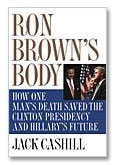Why Ron Brown Feared The NSA
by Jack Cashill
© WorldNetDaily
December 22, 2005
The late Ron Brown was not particularly paranoid. In fact, for most of his career, he conducted his business dealings cavalierly, smug in the knowledge that as a splendidly well-connected black Democrat he was all but immune to criticism from either the media or the law.
That began to change when he assumed his job as Bill Clinton’s Secretary of Commerce in early 1993, and it changed absolutely when he ran afoul of the Clintons nearly three years later.
As Brown learned upon taking office, the Department of Commerce was home to the Office of Intelligence Liaison. This sub-department received intelligence reports from various agencies about pending international deals. It then discreetly forwarded this information to companies that might benefit. Among the best sources of intelligence was a global spy system, codename ECHELON, which was created by the National Security Agency (NSA). This is the agency, of course, that congressional Democrats have scolded the Bush administration for employing to monitor potential terrorist communications
ECEHELON was capable of scrutinizing just about every fax, email, phone call, and telex message in the world. And like every other system during the Clinton years, especially the two desperate years preceding the election of 1996, it was fully capable of being abused.
As the Washington Times’ Insight Magazine reported in a series of articles, the Clinton administration wasted no time in securing trade information from foreign rivals and then bartering that info back to high level Democratic Party contributors competing for contracts. This activity reached a crescendo at the Asia-Pacific Economic Cooperation (APEC) summit in Seattle in 1993. There, according to classified records reviewed by Insight, American agents collected raw economic data on Asian businesses through a variety of sources: the FBI, the Customs Service, Naval Intelligence, the Air Force Office of Special Investigations, the NSC, and especially the NSA.
The FBI was reported to have bugged more than 300 locations at the APEC summit. As many as 15,000 conversations were then bounced from satellites to the NSA in real time. At the time, no one was more aware of the NSA’s capabilities than Ron Brown, who was the administration’s point man for Asia and later, under duress, its “bag man.” It is not at all impossible that the information gleaned at the summit warned him off a bribe he had been privately negotiating with the Communist government of Vietnam.
In May 1995, Janet Reno called for an independent counsel on another issue, namely to assess whether Brown had “accepted things of value” in exchange for his influence from his confidante and business partner, Nolanda Hill. In November of that same year, Janet Reno sent the request to court for the independent counsel to add Ron’s beloved son, Michael Brown, to the case.
In late December 1995, after Michael had been officially but quietly targeted, Ron Brown turned serious. He was the one person in America capable of bringing down the Clinton administration, and the Clintons knew it. His knowledge of their Asian dealings, which had not yet erupted into scandal, was the only real leverage he had in pressuring them to subvert the independent counsel.
“I know the Clinton Administration's NSA was eavesdropping and recording millions and millions of electronic communications on Americans,” Hill tells me. “Ron wouldn't talk on any phone about really sensitive things with a bearing on the Independent Counsel investigation because he knew his calls and mine were monitored. Data transmission such as credit card transactions were also monitored and the information passed on to FBI.”
In April 1996, Ron Brown solved his problems and the Clintons by dying in a plane crash that the Air Force still writes off as “inexplicable.” Before he died, he shared all his legal complications with Hill as a condition of her not seeking a separate deal with the Independent Counsel. The Clintons knew this. Although they let Michael Brown off with a slap on the wrist—he is running for mayor of Washington D.C. as I write—they persecuted Hill for years to keep her quiet.
“I never talked to my lawyers on the phone,” says Hill of this troubled period. “Always in person. I put a lot of miles on my autos going to Kentucky and Washington. And of course, I didn't use a cell phone for three years.”
Although the story is too complicated to summarize here, congressional leaders who are concerned with the misuse of the NSA should begin their inquiry with Ron Brown’s Commerce Department and follow the trail to Ron Brown’s death.
“This ‘eavesdropping’ isn't a Bush Administration phenom,” says Hill, a lifelong Democrat. No, she and Brown knew much better than that.

About Mega Fix:
In this stunning, surprisingly entertaining, 90-minute DVD video documentary, Emmy-award-winning filmmaker Jack Cashill traces the roots of Sept. 11 to the perfect storm of disinformation that surrounded the Clintons' desperate drive for the White House in the years 1995-1996.
Cashill leads the viewer from Oklahoma City to Dubrovnik, where Ron Brown's plane crashed, to the Khobar Towers in Saudi Arabia to the destruction of TWA Flight 800 off Long Island to the Olympic Park bombing. Jack Cashill's "Mega Fix" DVD is now available.

